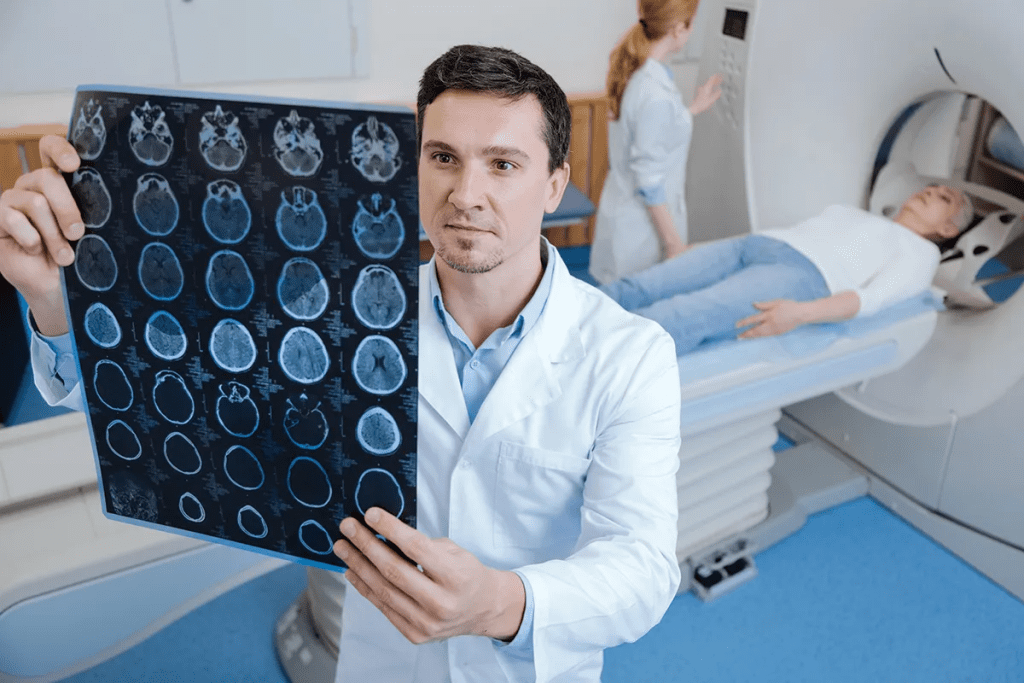Last Updated on November 13, 2025 by
A common myth says that most oncologists wouldn’t choose chemotherapy if they had cancer. But what do studies really show about how patients and doctors make cancer treatment choices?

The claim that 90% of oncologists would refuse chemotherapy is not supported by credible research. Studies reveal that cancer patients’ refusal rates vary. Whether or not to have chemotherapy depends on several things. These include the cancer’s stage and the patient’s health. Is it true 90 of oncologists wouldn’t take chemo? Debunk this terrible claim and learn the crucial, powerful facts about cancer treatment decision-making.
We look into the truth behind this claim and the real numbers on chemotherapy refusal. This shows our dedication to care based on evidence and focusing on the patient.
The idea that 90% of oncologists wouldn’t take chemotherapy has sparked a lot of debate. It has led to many questions about where this claim came from and how it became so well-known.
To find out where this claim started, we need to look at studies and surveys on oncologists’ treatment choices. It seems the claim might have come from a misunderstanding or misstating of data on oncologists’ views on chemotherapy.
Studies have shown that while some oncologists might question certain chemotherapy treatments, the real numbers are more detailed and complex.

The claim spread because of media coverage and online talks. Social media platforms and online forums helped spread this info, often without the right context or checks.
This led to the claim becoming popular and widely shared. It’s key to remember that online medical info spreads fast but often lacks scientific proof.
We should look at the sources of such claims and check the evidence they have. This helps us understand how many oncologists really refuse chemotherapy and what affects their choices.
To understand if oncologists would take chemotherapy, we need to look at the science. The idea that many oncologists would refuse chemotherapy has been talked about a lot. But, we must check the facts by looking at real research.
Looking closer, there’s no solid science backing the 90% claim. Studies and surveys on oncologists’ views on chemotherapy haven’t found this number to be true. Instead, they show that many factors influence their decisions, like the patient’s health and treatment goals.
Choosing to have chemotherapy is a complex decision. It depends on the cancer type, the patient’s health, and the treatment’s benefits and risks. Oncologists make these decisions based on the best evidence and what’s best for each patient.
Many studies have looked into what oncologists prefer when it comes to treatment. Surveys reveal that they consider many things, like how likely the treatment is to work and its side effects. They also think about how it will affect the patient’s quality of life.
One important finding is that oncologists often suggest treatments they would choose for themselves or their family. This shows they make decisions based on what’s best for their patients, not just their own preferences.

By looking at real research, we see that the story about oncologists refusing chemotherapy is more complex than the viral claim. It’s important to understand the many factors that go into cancer treatment decisions.
Recent studies have given us a clearer picture of how many cancer patients refuse chemotherapy. This has led to a lot of discussion about whether doctors would choose it for themselves. It’s important to look at the real numbers to understand why some patients choose not to have chemotherapy.
The National Cancer Database has shared important information about chemotherapy refusal in advanced-stage breast cancer patients. The data shows a high refusal rate, highlighting many reasons why patients make this choice.
The refusal rates for chemotherapy vary a lot, from 2.6% to 20%. This shows how complex the reasons for refusing treatment can be.
Several things contribute to this wide range:
Knowing these factors helps doctors and healthcare teams better support their patients. This can lead to better treatment results for everyone.
Decisions on cancer treatment involve many factors. Oncologists and patients must weigh these carefully. This is key to making choices that lead to the best results.
A patient’s age and health conditions are big factors. Older patients or those with health issues might not be good candidates for strong treatments like chemotherapy. This is because of the risks and side effects.
Older adults often have less energy to fight off chemotherapy’s side effects. People with heart problems might also face dangers from certain chemotherapy types.
The type, stage, and outlook of cancer are also important. Different cancers react differently to treatments. The cancer’s stage often decides how intense the treatment should be.
The treatment center’s features and the patient’s access to care also matter. Things like specialized care, clinical trials, and teams of doctors can affect treatment choices.
A cancer center with a team of doctors from different fields can offer complete care. This includes medical oncologists, radiation oncologists, surgeons, and more.
Understanding these factors helps patients and doctors make better treatment choices. This leads to better outcomes for everyone.
Choosing not to have chemotherapy is a big decision. It’s influenced by many factors that are special to each person. Patients have different needs, likes, and situations that shape their treatment choices.
For some, health issues are a big reason to skip chemotherapy. This includes those with serious health problems or who are too sick for chemo. “A detailed risk assessment is key to see if chemo is right for each patient,” say doctors. We take these factors into account to give care that fits each person.
How well a patient lives is also a big factor. Chemo’s side effects like nausea, tiredness, and hair loss can really affect daily life. We talk with our patients to know what matters most to them. This way, we make sure their treatment matches their goals.
One patient said, “I’d prefer a shorter time with family but with good quality, not a long time with bad quality because of chemo side effects.”
Some choose other treatments instead of chemo. This can be eating differently, using herbal supplements, or trying acupuncture. We support these choices while also pushing for treatments backed by science. “Adding complementary therapies to cancer care can help patients feel better and be happier,” studies show.
We aim to give care that respects patients’ choices. Our goal is to help patients make decisions that are best for them. This might include chemo or other treatments.
Choosing not to have evidence-based cancer treatment can lead to serious outcomes. It’s important to know the risks involved.
Research shows that not getting cancer treatment can mean worse survival rates. A study in the Journal of Clinical Oncology found patients who didn’t get chemotherapy had a higher risk of cancer coming back and dying.
Survival rates are affected by not getting treatment. We need to look at the numbers to see why sticking to treatment plans is key.
Many case studies and analyses have shown the effects of not getting cancer treatment. For example, a review found patients who didn’t get chemotherapy had more cancer spreading and lived less long.
Statistical evidence shows that following treatment plans leads to better results. We’ll look at some of these studies to see what refusing treatment means.
The link between not getting treatment and worse outcomes is a big area of study. Understanding this helps doctors tell patients about the risks of not getting treatment.
It’s also important to think about each patient’s situation. Things like age, health, and type of cancer affect the best treatment.
In summary, not getting evidence-based cancer treatment can have serious effects on survival. By looking at the evidence and case studies, we can see why following treatment plans is so important.
Oncologists are experts in cancer treatment. They face tough choices when it comes to their own health. This experience gives them a unique view on cancer treatment.
Many surveys have looked into how oncologists make their own medical choices. These studies show that they often pick treatments backed by science. They choose the most effective options available.
One key finding is that oncologists value treatments with solid scientific evidence. For example, they tend to prefer chemotherapy that has been proven to work.
When oncologists become patients, their experience shapes their view on treatment. This experience helps them weigh the pros and cons of different treatments.
They consider many factors, like the cancer type and their overall health. They also think about how treatment might affect their quality of life.
Evidence-based decision-making is key in oncology. Oncologists use the latest research and guidelines to guide their choices. This is true for their patients and themselves.
This approach ensures treatments are both effective and safe. Oncologists are trained to carefully review data and apply it to each case. This skill helps them make complex decisions.
Key aspects of evidence-based decision-making include:
Understanding how oncologists make their own decisions highlights the importance of evidence-based medicine. It also shows the complexity of cancer treatment.
Chemotherapy has changed a lot over the years, giving new hope to cancer patients everywhere. It’s important to know how chemotherapy has evolved and how it affects patient care.
Chemotherapy has grown from its early days, when treatments were harsh and not very effective. Now, modern chemotherapy is more targeted and works better, aiming to improve patient outcomes and quality of life. We’ve seen the creation of different chemotherapy plans for various cancers and patient needs.
New drugs and treatment methods have made chemotherapy more effective. For example, anthracyclines and taxanes are now used to treat many cancers. These changes have led to better survival rates and fewer cancer comebacks.
Targeted therapies are a big step forward in chemotherapy. They focus on specific parts of cancer cells, harming fewer healthy cells and causing less side effects. These therapies have shown great promise in treating cancers like breast, lung, and colorectal.
These targeted methods have not only made treatments more effective but also reduced side effects from traditional chemotherapy.
Personalized medicine is key in oncology, with chemotherapy tailored to each patient’s needs and tumor characteristics. Genetic profiling and biomarker testing help doctors find the best treatment for each patient.
We can now create treatment plans based on a patient’s genetics, medical history, and lifestyle. This approach has shown great promise in bettering treatment results and patient happiness.
Medical misinformation, like myths about cancer treatments, is a big worry today. It’s not just about false info. It’s also about how our minds work when we hear it.
Myths about cancer treatments stick around because of fear and distrust. People also look for other ways to understand and fix problems. Knowing why these myths stick is key to fighting them. For example, the idea that “90% of oncologists wouldn’t take chemo” plays on fears and distrust, making it believable and spreadable.
Some reasons myths stick include:
Social media is a big place for health myths to grow. It’s easy to share info, and false info about cancer treatments can spread fast. Often, this info isn’t checked or confirmed by experts.
Research shows social media’s big role in spreading health myths. For example:
It’s important to know how to find reliable medical info. Here are some tips:
By being careful and critical, we can fight medical misinformation. This helps us make better health choices.
The choice to have chemotherapy is complex. It depends on many factors. Knowing how many oncologists might choose it themselves can help understand its benefits and risks.
While some claim 90% of oncologists wouldn’t choose chemotherapy, this isn’t backed by science. Yet, it shows the importance of making informed choices in cancer treatment.
Oncologists look at many things when deciding on treatment. These include the cancer type and stage, the patient’s health, and how well the treatment might work. By understanding these, patients and doctors can make the best choices together.
At Liv Hospital, we aim to provide top-notch healthcare. We support international patients with personalized care. This ensures everyone gets the care they need.
Whether oncologists would choose chemotherapy themselves isn’t the main point. What’s key is making choices based on the latest evidence and what’s best for the patient. This way, cancer treatment can be effective and fit each person’s needs.
The claim that 90% of oncologists would refuse chemotherapy is not supported by scientific evidence. Studies show a more nuanced view of how oncologists make treatment decisions.
The National Cancer Database shows chemotherapy refusal rates vary. They range from 2.6% to 20%. This variation is due to factors like age, health conditions, and where treatment is received.
Decisions on cancer treatment depend on several factors. These include the patient’s age, health, type and stage of cancer, and the treatment center. Understanding these factors helps in making informed choices.
Patients might choose not to have chemotherapy for various reasons. These include medical reasons, concerns about quality of life, or other treatment options. These factors are key in patient-centered care.
Not choosing evidence-based cancer treatment can affect survival. Studies and case examples highlight the importance of informed decisions.
Oncologists’ decisions are shaped by their professional knowledge and personal experiences. Surveys and studies offer insights into their views on cancer treatment and making evidence-based decisions.
Modern chemotherapy has evolved. It now includes targeted therapies and personalized approaches. These advancements aim to reduce side effects and improve outcomes. Understanding these advancements is key for informed decisions.
Patients can find reliable information by being cautious of health misinformation, like on social media. They should seek information from trusted sources.
Whether oncologists would choose chemotherapy depends on several factors. These include the cancer type and stage, their overall health, and personal preferences. Like other patients, oncologists consider these factors when deciding on treatment.
There’s no single percentage that accurately shows how many oncologists would choose chemotherapy. Treatment decisions are highly individualized and depend on specific circumstances.
Subscribe to our e-newsletter to stay informed about the latest innovations in the world of health and exclusive offers!